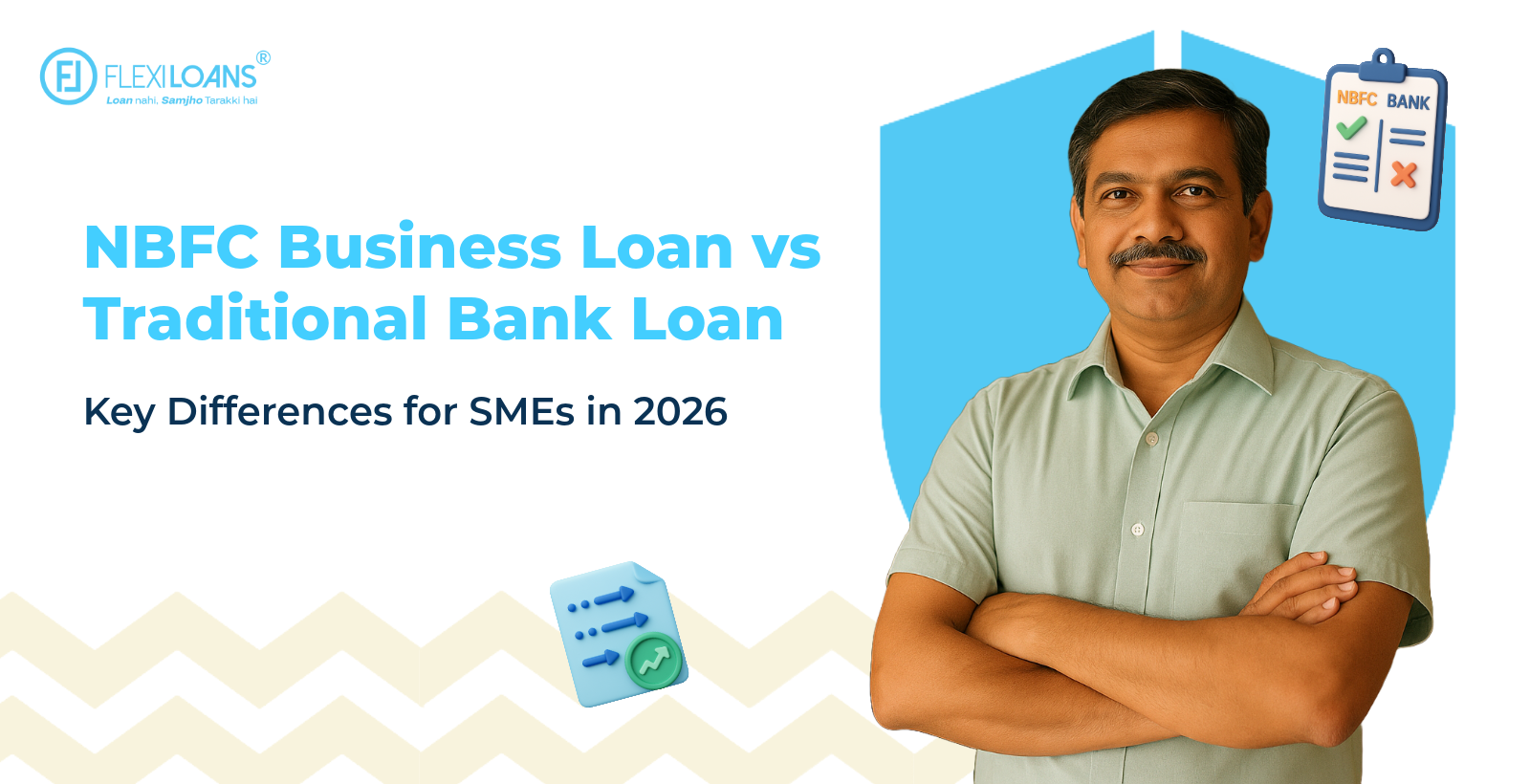May 24, 2021
Jan 14, 2026

Regardless of the type and size of a business, capital is an essential component for meeting the regular operational demands. Different types of financing options are available based on the business domain, stage, and types.
What is a Commercial Loan?
Any loan provided by a financial institution to a business for their working capital or operational expenses is known as a commercial or business loan. Small and medium-sized businesses rely on various lending platforms or products, such as short-term loans, lines of credit, or unsecured business loans, to access capital. Due to various regulatory constraints and high costs, many such businesses face problems accessing equity or bond markets.
Why Do You Need Commercial Loans?
A commercial loan for business is required for various purposes, such as business expansion, inventory management, debt consolidation, investments in new equipment or technology, and day-to-day work requirements. Let us understand each of them in detail.
Capital Needed for Expansion
Businesses that have already built a good product-market fit and established their brand value in the market focus on moving to the next growth stage. They need capital to expand geographically or to develop their product lines.
To Purchase New Equipment or Technology
New technological developments are evolving and improving efficiency, productivity, and overall business output. Many small businesses are seeking capital to invest proactively in new-age technologies, tools, and equipment to gain a competitive advantage in the market.
Investments in Inventory Management
The purchase and management of large amounts of inventory are capital intensive. Many small businesses refuse big orders due to their small quantity of inventory storage. They avail themselves of commercial loans to purchase raw materials and store them.
Apart from these three use cases, businesses need to have healthy working capital to keep up with the market conditions or overcome any adversities. Commercial loans help them ease their day-to-day operations and run more smoothly.
Types of Commercial Loans
The majority of the financial institutions in India provide seven types of commercial loans. Let us discuss them in detail.
Term Loan
It is one of the most common types of commercial loans. A term loan for business, as the name suggests, is usually for a specific period (one to 20 years). The duration is small, and interest rates are high for unsecured loans. Secured term loans can have a tenure as high as 20 years and lower interest rates, generally fixed at a quarterly or monthly repayment cycle.
Letter of Credit
It is a document backed by a financial institution for any payment due to the seller. It is a promise or insurance by the bank to the seller, most commonly used in trade financing (local or overseas) where both the parties don’t know each other well.
MSME Loan (Collateral-free)
MSMEs in India can avail of a business loan without collateral. It was promoted to uplift MSMEs in the country, which contribute significantly to the GDP. These collateral-free commercial loans to SMEs help purchase machinery and equipment needed for manufacturing, expansion, or working capital requirements.
POS Loans
It is a financing option offered at the purchase or sale interaction point to assist in purchasing that particular product.
Equipment-based Loans
It is a financing option for borrowers who wish to purchase new machinery or equipment that help their business. The different types of equipment can be high-value construction, agriculture, or manufacturing units, which pose a difficulty to the businesses’ working capital.
Overdrafts
It is offered by banks where you can withdraw cash, despite the status of your account balance. The credit limit depends on the borrower’s credit history, and collateral is necessary.
Working Capital Loan
It is usually available to meet the daily requirements of the business and is short-term, with a tenure of up to one year or less. However, interest rates are comparatively higher.
What Are the Benefits of Availing a Commercial Loan?
Easier Access to Working Capital Requirements
As discussed earlier, commercial loans provide easier access to working capital, especially for small and medium businesses. The capital can be utilised for various purposes, including the day-to-day operations of the organisation.
No Dilution of Ownership or Equity
Usually, when a business raises equity from angel investors or venture capital, the business owner has to dilute their shares in the process. By availing of commercial loans, the business gets access to capital, and the owner does not have to dilute their ownership.
Seamless and Simple Application Process
Previously, applying for and availing of a commercial loan was a time consuming, demanding, and tiring process. With technology disrupting every industry, many new-age financial institutions have emerged, and the majority of the old ones have also started leveraging breakthroughs to keep up with the market. The process of applying for a commercial loan has become extremely simple and hassle-free.
Steps to Apply for a Commercial Loan
The following steps are involved in applying for a commercial loan.
1. Pre-Qualification Process
Any lender first evaluates the financials of the business, outstanding debt, and the purpose or need for capital. In this process, the lender establishes the borrowing capacity and other regulatory aspects for the business.
2. Filing Your Loan Application
Post-pre-qualification, the business owner must fill in the application and submit all the required documents mentioned by the lender that are related to the firm, including financial models, bank statements, and collaterals.
3. Review of Your Loan Application
Every loan application is usually handled by a loan officer who will evaluate the application. The loan officer is responsible for reviewing all the documents, income projections, credit history, and founder background.
4. Loan Committee
After a review of documents by the loan officer, they are passed onto the committee that further conducts due diligence and decides whether the loan can be approved. It sometimes asks for details in the due diligence process to understand the business better.
5. Approval of Term Sheet
After approval by the loan committee, the owner receives a term sheet from the loan processor. It contains all the details related to the loan, such as the amount, use of the loan, interest rates, term, and collateral. When the term sheet is signed, third-party reports are generated.
6. Closure
Once this whole process is completed, the entire application with all the details is sent to the underwriter for final approval. After the underwriter’s approval, the business owners need to provide their signatures on the final documents. It marks closure, and the loan gets disbursed.
Eligibility Criteria for Commercial Loans
While applying for a business loan, you must fulfil the commercial loan eligibility criteria. Here is the paperwork you must provide to ensure that your application is reviewed as quickly as possible.
- The applicant must be 21 years of age and not more than 65 years old while applying for the loan.
- Commercial loans are given to sole proprietors, individual corporations, and private companies involved in trading, services, or production.
- The candidate must have worked for three years and possess at least five years of experience in the industry.
- The applicant must verify the paperwork well before applying for a loan. It should be in digital format to submit easily during the application process.
Documents Required to Apply for Commercial Loans
- Personal KYC: A PAN card is needed.
- Residential Address Proof: Any one of the following documents is accepted.
– Rent agreement
– Driver’s license
– Voter ID
– Ration card
– Aadhaar
– Passport
- Banking: The bank statements for the last six months are accepted.
- Business KYC: Any one of the following documents is accepted.
– GST registration certificate
– Shops and establishment certificate
- Financial documents (applicable for loans greater than 20 lakhs): Two years’ records of audited financials, the ITR for the previous two years, and the GST returns for the preceding six months are required.
Conclusion
Having discussed all commercial loans, checkout FlexiLoans, a new age non-banking financial company that provides loans to women entrepreneurs, SMEs, and MSMEs. FlexiLoans aims to solve the capital requirements of many startups, innovative businesses, and facilitate growth.







